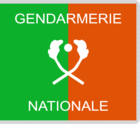Gendarmerie Nationale (Niger)
| National Gendarmerie of Niger Gendarmerie Nationale Nigérienne | |
|---|---|
 Emblem | |
 Flag | |
| Agency overview | |
| Formed | 1962 |
| Preceding agency |
|
| Jurisdictional structure | |
| Operations jurisdiction | Niger |
| General nature | |
| Operational structure | |
| Agency executive |
|
| Parent agency | Ministry of Defense |
The Gendarmerie Nationale (French: Gendarmerie Nationale Nigérienne) is the national gendarmerie of Niger. The Gendarmerie Nationale are under the Niger Armed Forces and report to the Ministry of Defense. They are responsible for law enforcement in rural areas. Niger's civilian police force, the National Police, is a separate agency under the Ministry of Interior, Public Safety and Decentralization, and are responsible for policing in urban areas.
The Gendarmerie Nationale numbers approximately 3,700 members. The Gendarmerie Nationale is modeled on the National Gendarmerie of its former colonial power, France.[1][2] As a paramilitary, it is uniformed, ranked and trained in military fashion.
The Gendarmerie Nationale sponsors a semi-professional football club, Union Sportive de la Gendarmerie Nationale, which plays in the Super Ligue.
History
Following the creation of the Republic of Niger and in anticipation of its independence, the Gendarmerie Nationale began transferring leadership to Nigerien officers. In August 1962, Lieutenant Badie Garba replaced Captain Maurice Dapremont then Superior Commander of the Gendarmerie Nationale, becoming the first Nigerien head of the Gendarmerie.[3]
When the Police Nationale was moved to the Ministry of Interior in 2003, the FNIS fell under their jurisdiction, while the Gendarmerie remained under the Nigerien Ministry of Defense.[4]
Structure and organization

The Gendarmerie Nationale is headquartered in Niamey and has four regional Groupements based in Niamey, Agadez, Maradi, and Zinder.[5] A highway police unit known as the Brigade Routière is also a part of the Gendarmerie Nationale, charged with providing security to the nation's highways. The unit mainly operates highway checkpoints.[6]
Specialised units
The GN includes police patrol and institutional security units, as well as specialised units, including a Niamey Motorcycle Unit (Peloton de sécurité routière de Niamey) for traffic and VIP escort duty,[7] a Telecommunications section (Division Télécommunication de la Gendarmerie),[8] and a nautical unit (Gendarmerie Fluviale).
Fluvial Brigade

In the wake of the
Ranks
| Rank group | General / flag officers | Senior officers | Junior officers | Officer cadet | ||||||||||||||||||||||||||||||||
|---|---|---|---|---|---|---|---|---|---|---|---|---|---|---|---|---|---|---|---|---|---|---|---|---|---|---|---|---|---|---|---|---|---|---|---|---|
| Général d'armée | Général de corps d'armée | Général de division | Général de brigade | Colonel | Lieutenant colonel | Commandant | Captaine | Lieutenant | Sous-lieutenant | Aspirant | ||||||||||||||||||||||||||
| Rank group | Senior NCOs | Junior NCOs | Enlisted | |||||||||||||||||||||||||||||||||
|---|---|---|---|---|---|---|---|---|---|---|---|---|---|---|---|---|---|---|---|---|---|---|---|---|---|---|---|---|---|---|---|---|---|---|---|---|
| Major | Adjudant-chef | Adjudant | Maréchal des logis chef | Maréchal des logis | Gendarme de 1re classe | Gendarme de 2e classe | Gendarme de 3e classe | Gendarme de 4e classe | Gendarme auxiliaire | |||||||||||||||||||||||||||
School and Training
As of 2008, training of the Gendarmerie Nationale is conducted at the National Gendarmerie School (L'école nationale de la Gendarmerie) at Koira Tagui in Niamey. Training was previously conducted at Camp Tondibiah, a military base in Niamey and the primary training center for the Army corps. The first graduating class of the school included 1000 gendarmes, of whom 70 were women.[11]
See also
References
- ^ Framework partnership document France - Niger (2006-2010) Archived February 24, 2012, at the Wayback Machine, Ministère des Affaires étrangères (France), 2006. DOSSIER NIGER: Les forces armées nigériennes (FAN), Ministère des Affaires étrangères (France), 2003.
- ^ La Mission de Coopération Militaire et de Défense Archived October 23, 2007, at the Wayback Machine. Embassy of France in Niamey. 2008.
- ^ Book - Armée et politique au Niger. Editor Idrissa Kimba. Publisher African Book Collection. 2008
- ^ Déplacement du Directeur au Niger Archived February 14, 2012, at the Wayback Machine, Ministère des Affaires étrangères (France).
- ISBN 978-1-349-07782-3.
- ISBN 978-0-307-79371-3.
- ^ Remise de cinq motos à la Gendarmerie Nationale Archived 2011-07-16 at the Wayback Machine. Embassy of France to Niamey (2008)
- ^ Le projet Transmissions Interarmées Archived 2011-07-16 at the Wayback Machine. French Embassy at Niamey (2008)
- ^ Aide français à la gendarmerie fluviale du Niger Archived 2011-07-16 at the Wayback Machine. French Embassy at Niamey (2008).
- ^ a b Bureau international des droits des enfants (December 2012). "État des Lieux: Formation des forces de défense et de sécurité sur les droit de l'enfant au Niger" (PDF) (in French). p. 34. Retrieved 28 September 2020.
- ^ Visite du ministre de la Défense Nationale à l'école de la Gendarmerie nationale : encourager les recrues à plus d'abnégation. Habibou Ousmane, Le Sahel. 10 June 2009
- Gendarmerie Nationale du Niger. African Development Information Database. Accessed 2009-06-10.
